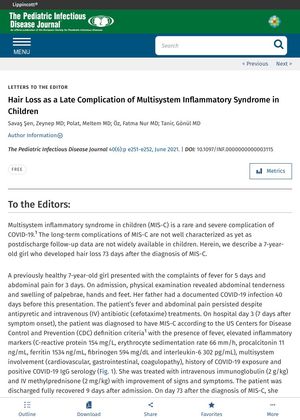TLDR Hair loss may be a delayed side effect of Multisystem Inflammatory Syndrome in children after COVID-19.
In 2021, a case study was conducted on a 7-year-old girl who developed hair loss 73 days after being diagnosed with Multisystem Inflammatory Syndrome in Children (MIS-C), a severe complication of COVID-19. The patient had no previous history of hair loss and all other potential causes of hair loss were ruled out through a detailed laboratory workup. The hair loss was diagnosed as Telogen effluvium (TE), a common form of nonscarring hair loss that can be triggered by acute illness, systemic diseases, and severe emotional stress among other factors. This case suggested that hair loss could be a late complication of MIS-C. However, the authors noted that future studies were needed to define the long-term complications of MIS-C.
 58 citations
,
November 2020 in “International Journal of Dermatology”
58 citations
,
November 2020 in “International Journal of Dermatology” COVID-19 may cause a temporary hair loss condition called telogen effluvium in some patients after recovery.
 24 citations
,
January 2015 in “Current problems in dermatology”
24 citations
,
January 2015 in “Current problems in dermatology” The document concludes that accurate diagnosis of hair loss in children is crucial due to limited treatment options and the condition's psychological impact.
 September 2024 in “The Italian Journal of Pediatrics/Italian journal of pediatrics”
September 2024 in “The Italian Journal of Pediatrics/Italian journal of pediatrics” COVID-19 vaccination may be linked to MIS-C in children, highlighting the need for quick diagnosis and treatment.
 January 2023 in “Acta dermatovenerologica Alpina, Pannonica et Adriatica (Tiskana izd.)”
January 2023 in “Acta dermatovenerologica Alpina, Pannonica et Adriatica (Tiskana izd.)” The article concludes that schoolchildren and adolescents experienced various skin issues during the COVID-19 pandemic, including acne from masks and other skin reactions from the virus and vaccines.
 September 2023 in “medRxiv (Cold Spring Harbor Laboratory)”
September 2023 in “medRxiv (Cold Spring Harbor Laboratory)” Long-COVID has diverse, long-term health impacts, especially in young people.
 October 2025 in “Journal of Pharmacy And Bioallied Sciences”
October 2025 in “Journal of Pharmacy And Bioallied Sciences” Post-COVID, many patients experience skin issues like hair loss and herpes reactivation, especially in middle-aged women.
 1 citations
,
June 2023 in “BMC Pediatrics”
1 citations
,
June 2023 in “BMC Pediatrics” Most children recovered from COVID-19 in 4 weeks, but some experienced long-term symptoms, especially older kids.







